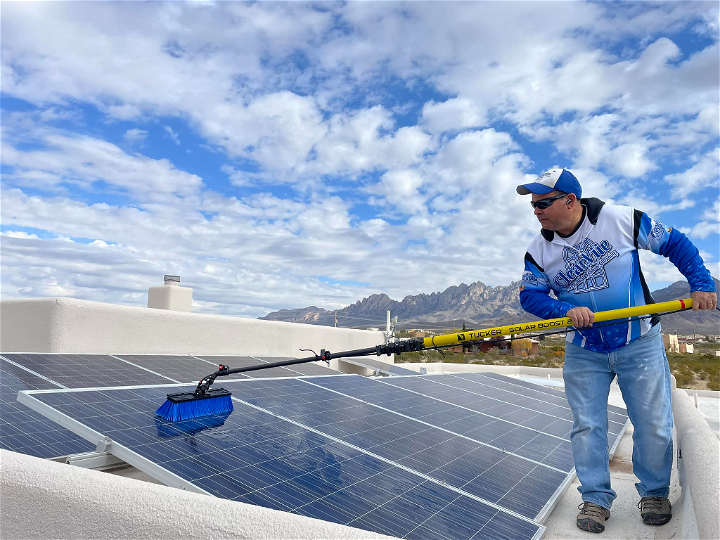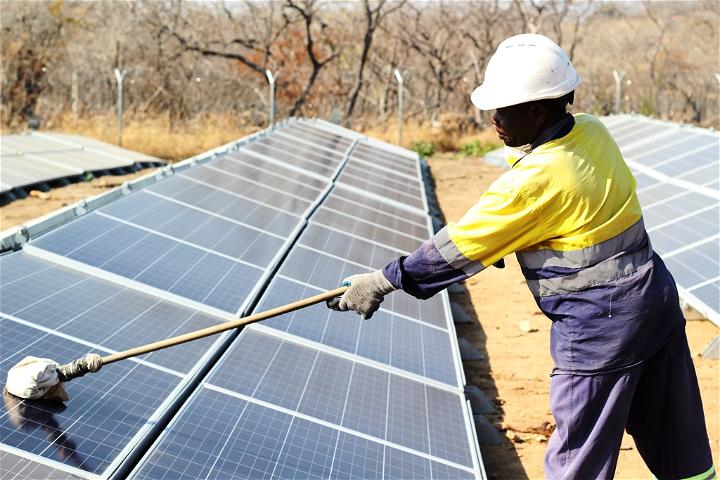Solar energy systems are rising throughout the United States, with solar installations increasing by 34 percent between 2020 and 2021. Investing in a residential solar system is an excellent way to save money on energy costs while helping the environment. Solar panels are more affordable and accessible than ever, and you’ll enjoy peace of mind when powering your home in the future.
One of the most significant responsibilities of owning solar panels is the solar cleaning routine. Avoiding the common errors in cleaning solar systems is crucial to help your solar panels last for decades. The wrong cleaning solutions and equipment could cause irreparable damage.
Luckily, you’ve found the perfect guide to learn how to avoid these errors and provide protection for your solar panels. Continue reading to maximize your investment in solar energy for your household today!

1. Using Abrasive Materials
Solar panels are tough and built to withstand severe weather, high winds, and hail. That said, using abrasive materials to clean the solar panels could scratch them and hamper their ability to collect energy from the Sun. Using soft cloths like microfiber towels is best when handling your cleaning routine.
The chemicals you use could also cause significant damage to your new panels. Harsh chemicals like acid and bleach will damage your panels and prevent them from collecting energy as designed.
The best approach is to use liquid soap and warm water to wipe dirt, debris and leaves off the panels. Vacuums and window cleaners are also effective ways to clean your solar system.
2. Over-Cleaning
Over-cleaning your solar panels is a common error many homeowners make after investing money into a solar system. It seems logical since you want to get the most value from your system for as long as possible. Cleaning too much reduces the performance of the panels, which takes away from your investment.
Stick to cleaning your solar panels only when necessary. Remember to apply slight pressure to your panels to avoid damaging the cells inside. Too much pressure will also cause scratches on the panels’ surface, which is expensive to replace or repair.
Learning the proper way to handle your solar cleaning routine will save your panels and help you save money. Maximize your savings by using soft cloths and waiting to clean your panels until necessary.
3. Using the Wrong Solar Cleaning Equipment
The wrong solar cleaning equipment is another common error in cleaning solar systems for your energy needs. Regular window cleaning solutions are not the answer when wiping down your panels. The ingredients in these products are shown to damage the surface of solar panels.
Focus on the proper solar cleaning equipment when spending money to get solar energy for your home. These products are formulated to help your solar panels stay clean without causing damage. You’ll also prevent streaking on the panels’ surface so the cells can collect energy from the Sun during the daylight hours.
Be gentle even when using the solar cleaning equipment designed for your home’s panels. Too much pressure will cause damage that leads to extensive repairs. You’ll save on maintenance costs and prolong the life of your roof’s panels.
4. Ignoring Safety
Solar energy systems are powerful, and you must consider safety to avoid dangerous errors in cleaning solar systems. Most solar systems are installed on the roof, so you need to prepare for safety precautions due to the height of the home. Only work on your solar panel cleaning routine once you have ideal weather.
It’s best to wear a safety harness to protect you if you slip or fall off the roof. Thick gloves and long sleeves are also recommended for your safety and protection. You’ll add a protective layer to prevent electric shock.
You should also turn off your solar panels before getting on the roof to clean them. You’ll decrease the risk of injury or death by taking the proper precautions for your solar energy system.
5. Cleaning in Direct Sunlight
Cleaning in direct sunlight is a mistake if you want your solar panels to last. You’re more likely to produce streaks on the solar panels when wiping them down and cleaning them during peak sunlight hours. Focus on cleaning the panels during the early morning or late afternoon hours when the Sun is lower in the sky.
By timing the cleaning routine correctly, you’ll eliminate streaks and hotspots with your panels. Your panels won’t have any obstructions preventing them from collecting the energy needed to power your home’s appliances.
6. Not Checking for Damage
The best time to check your solar panels for damage is when you’re on the roof handling your cleaning routine. It’s best to inspect each panel for signs of damage before wiping them down and removing debris. The first signs of damage to look for are cracks in the glass surface and loose wiring running to and from the panels.
These issues could worsen if you don’t invest the time and resources to fix them. It’s best to handle the matter as soon as you spot it by contacting your local solar installation company. You’ll have an expensive mess with solar panel designs on your hands if you leave the damage for another time.

7. Not Cleaning Regularly
Cleaning too often is bad for your solar energy system, but so is putting off your solar panel maintenance. Part of your responsibility as a homeowner is to clean your panels to prevent damage and debris consistently. It’s a good rule of thumb to clean your solar panels once annually to keep them clean and functioning.
Avoid These Errors in Cleaning Solar Systems
Investing in solar panels is a wise decision since you’ll get money back in tax credits and save big on energy costs, but it’s critical to learn how to handle a solar cleaning routine. Avoid errors in cleaning solar systems by using proper solar cleaning equipment and avoiding harsh chemicals that damage your panels.
Clean your panels once per year and check for damage when on the roof. Avoid abrasive materials, and use light pressure to wipe down each panel.
Adding value to your home is one of the most enjoyable parts of becoming a homeowner. Check out more of our Home and Real Estate blog content for the latest news and tips when tackling home improvement projects today!
